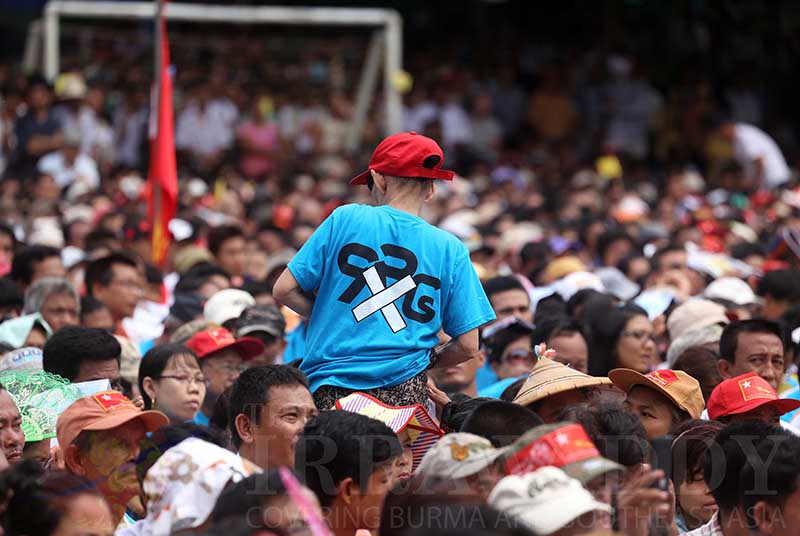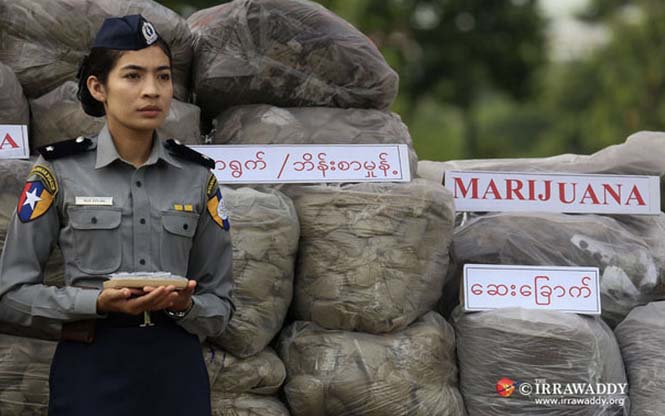Posts Tagged ‘Union Solidarity and Development Party’ (83 found)
Burma Must Amend the 2008 Constitution for the Reform to be Genuinely Democratic
 The National League for Democracy (NLD) and its leader Daw Aung San Suu Kyi, have faced intimidation from Burma’s electoral commission in recent weeks as the campaign to amend Burma’s 2008 Constitution continues to draw strong support throughout the country. As the public rallies behind the campaign, Burma’s ruling Union Solidarity and Development Party (USDP) have accused the campaign leaders of sowing public unrest and disorder.
The National League for Democracy (NLD) and its leader Daw Aung San Suu Kyi, have faced intimidation from Burma’s electoral commission in recent weeks as the campaign to amend Burma’s 2008 Constitution continues to draw strong support throughout the country. As the public rallies behind the campaign, Burma’s ruling Union Solidarity and Development Party (USDP) have accused the campaign leaders of sowing public unrest and disorder.
Last month, Daw Aung San Suu Kyi spoke to a crowd of over 20,000 supporters in Mandalay, calling on the military to forgo their fear of constitutional amendment in support of democratic reform. According to a recent statement from Human Rights Watch, the Union Electoral Commission (UEC) subsequently warned the NLD leader that such comments are illegal and unconstitutional, and could jeopardize her party’s re-registration ahead of by-elections in 2014. The NLD has responded to the UEC’s warning as inappropriate, owing to the fact that political parties are allowed to stage rallies so long as they are in accordance with the law.
• • •Another Great year for Burma’s Drug Trade
 It is of no surprise that the latest report from the UN’s Office for Drugs and Crime (UNODC) on synthetic drugs finds that methamphetamine production in Burma continues to rise. Burma is already the second highest producer of opium in the world after Afghanistan and the fact that production rates of both opium and methamphetamine are increasing year on year points to a more complex picture than simply increase in demand. Poverty, displacement, conflict, and government complicity are all factors in this miserable state of affairs.
It is of no surprise that the latest report from the UN’s Office for Drugs and Crime (UNODC) on synthetic drugs finds that methamphetamine production in Burma continues to rise. Burma is already the second highest producer of opium in the world after Afghanistan and the fact that production rates of both opium and methamphetamine are increasing year on year points to a more complex picture than simply increase in demand. Poverty, displacement, conflict, and government complicity are all factors in this miserable state of affairs.
According to the UNODC report, “2014 Global Synthetic Drugs Assessment – Amphetamine-type Stimulants and New Psychoactive Substances,” that was released in Tokyo, Japan on 20 May 2014, seizures of methamphetamine in Asia have tripled over the past five years. The report highlights how most of the methamphetamine seized in Thailand, Bangladesh, and Burma itself, originates in Burma, while Jason Eligh, country manager for UNODC Burma states that, “according to expert perception, a large share of methamphetamine pills seized in China in 2012 originated from Myanmar.” This report complements a UNODC report on opium production in Burma released six months ago that showed a 26% increase from the year before, the highest recorded levels since monitoring began in 2002 […]
• • •BURMA: Letter to President Obama on Continuing National Emergency
Dear President Obama,
Our organizations urge you to continue the national emergency with respect to Burma. Since May 20, 2013, the Burmese government has failed to substantively address any of the concerns that informed the renewal of Executive Order 13619 […]
• • •Burma’s Democracy Movement Enters into the New Playing Field by Winning at least 39 Seats in the By-Lection, Yet Still Full of Landmines, Barriers, and Biased-Referees
Burma’s democracy leader, Daw Aung San Suu Kyi said during a press conference on March 30, 2012 “What has been happening in this country is really beyond what is acceptable for a democratic election. Still, we are determined to go forward because we think that is what our people want […]
• • •The Cause of Cessation of Civil War and Realization of National Peace – The Cause of Entire People
The civil war in Burma is a dreadful war that came into being since 1948. After sixty years, no successive government has been able to stop the civil war and achieve genuine peace. The SLORC-SPDC military regime’s attainment of ceasefire with ethnic armed forces was but a long-term plan to corral them into surrender […]
• • •Secretary Geithner Urged to Take Action on Cronies Providing Economic and Political Support to the Regime in Burma
The U. S. Campaign for Burma (USCB), a Washington, DC-based human rights organization campaigning to end crimes against humanity and the culture of impunity in the Southeast Asian country of Burma, today strongly urged U.S. Secretary of Treasury Timothy Geithner to take action on cronies who are providing […]
• • •The Handover that Wasn’t: Burma’s Military Regime Transfers Power Back to Itself
On 30 March, Senior-General Than Shwe officially dissolved the State Peace and Development Council (SPDC) to make way for the new Union Government, but the formal handover of power from the SPDC to the current military-dominated government appears to […]
• • •There’s a New Parliament, but the SPDC is Still in Charge
Despite the inauguration of parliament on 31 January 2011, the State Peace and Development Council (SPDC) remains firmly in control of Burma’s political landscape. In the lead up to the official transfer of power, which will reportedly occur on 15 March 2011, current and former SPDC members continue to shape Burma’s political future to ensure the military’s dominant position in all levels of the future government.[…]
• • •The Military Regime Lives on in the New Parliaments
On 31 January 2011, Burma’s parliament began its inaugural session, allegedly ending decades of military dictatorship. However, as the first week has shown, the military regime is still alive and well in the new Union Solidarity and Development Party (USDP) controlled government. This parliament is not a step in a slow transition to democracy. It is simply a new phase of the same old military rule […]
• • •မတရားဆံုး မတရားမႈမ်ား – ၂၀၁၀ ေရြးေကာက္ပြဲ
၂၀၁၀ ေရြးေကာက္ပြဲ၏ မသမာမႈမ်ားကို ေဖာ္ထုတ္ဖြင့္ခ် စုစည္းတင္ျပထားေသာ အစီရင္ခံစာတေစာင္ကို “မတရားဆံုး မတရားမႈမ်ား” အမည္ျဖင့္ ျမန္မာႏိုင္ငံဒီမိုကရက္တစ္အင္အားစုမ်ားမွ ၂၀၁၀ ခုႏွစ္၊ ဇန္နဝါရီလ၊ ၃၁ ရက္ ေန႕စြဲျဖင့္ ထုတ္ျပန္လိုက္သည္။
ထို႕အျပင္ ေရြးေကာက္ပြဲတခု၏ လြတ္လပ္မႈႏွင့္ တရားမွ်တမႈ ရွိမရွိကို တိုင္းတာသည့္ ႏိုင္ငံတကာစံႏႈန္း (၁၆) ခ်က္ကို ဤအစီရင္ခံစာတြင္ ေဖာ္ျပထားျပီး နအဖစစ္အစိုးရမွ ျပဳလုပ္ခဲ့သည့္ ၂၀၁၀ ေရြးေကာက္ပြဲသည္ ၎စံႏႈန္းမ်ားအနက္ တခ်က္ႏွင့္မွ် မကိုက္ညီေၾကာင္း ေထာက္ျပထားပါသည္။ ထိုေရြးေကာက္ပြဲ၏ ရလဒ္ျဖစ္သည့္ ယေန႕ေခၚယူေနေသာ လႊတ္ေတာ္မ်ားမွာလည္း တိုင္းျပည္၏ လက္ရွိအၾကပ္အတည္းမ်ားကို ေျဖရွင္းေပးႏိုင္မည့္ အေျခအေန လံုးဝကင္းမဲ့ေနေၾကာင္းကို အစီရင္ခံစာတြင္ အခ်က္အလက္မ်ားျဖင့္ ေထာက္ျပထားပါသည္ […]









 All posts
All posts